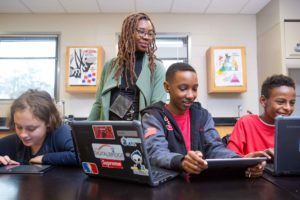
The Tools Competition is thrilled to announce the seven winners selected from 116 submissions in the Facilitating Learning Science Research track!
Researchers, developers, and educators too often work in silos, stunting advancements in education. Improving researchers’ ability to access quality data and conduct experimentation can lead to enhanced K-12 edtech solutions, educator professional development, and classroom implementation—with the ultimate goal of boosting student learning. This track sought to identify tools that facilitate the learning science research process in order to improve K-12 learning interventions and expand the field’s knowledge of what works for learners.
Winning tools in this track are designed to support a range of research needs and engage broad types of researchers—spanning academics, teachers conducting research, and schools engaging with data and evidence. Many tools leverage cutting edge AI, including large language models and generative models, to improve our understanding of learning.
This track was run in partnership with the Bill & Melinda Gates Foundation and the Jacobs Foundation.
Winners of the Facilitating Learning Science Research Track
- ConRAd: Conversational Research Advisor | Vanderbilt University (Catalyst Award)
ConRAd is a conversational agent that will help educators navigate a large corpora of research findings and discover usable, research-backed practices.
- Handwritten Math Benchmark for LLMs | Teaching Lab (Catalyst Award)
Teaching Lab’s open source benchmark dataset composed of images of handwritten student math work will improve the ability of multi-modal LLMs to understand and interact with handwritten student work.
- ReSource | Playpower Labs (Catalyst Award)
ReSource enables educators and researchers to conduct A/B testing of AI and digital learning experiences—streamlining the process of creating and deploying simple field trials to allow for rapid evaluation and enhancement of instructional approaches.
- School Impact Platform | ImpactEd Group (Growth Award)
The School Impact Platform helps schools generate better evidence about what works for learners in their context—enabling educators to trial and track the impact of initiatives in real-time while developing a unique school-generated dataset on effective educational interventions.
- AnSearch | Eedi (Transform Award)
AnSearch combines the speed of AI with the expertise of educators to generate formative assessment questions that target common misconceptions—leveraging and expanding a unique dataset of student responses to drive insights into the evaluation of GenAI in education, effective question design, and more.
- Automated Pre-/Post-Testing in Kolibri for Offline Learning Environments | Learning Equality (Transform Award)
Learning Equality’s tool enhances educational assessments in low-resource, offline environments through automated generation of balanced pre- and post-tests, drawing from a vast question bank supplemented by AI.
- Terracotta Messages | Indiana University (Transform Award)
Terracotta—an open-source experiment builder that plugs into a learning management system course site—is building Terracotta Messages to conduct rigorous research on personalized messages that teachers send to students.
The Learning Equality team was also named the recipient of the Implementation Impact Prize and was awarded an additional $100,000. The Implementation Impact Prize sought to spur high-impact partnerships to conduct research in a school setting. Competitors were invited to propose implementation plans including co-designed research questions and a strategy to incorporate research findings with a school district or consortium of districts.
Learn more about winners for all tracks here.
The Tools Competition is open to tools at all stages of development and is run over three phases with support for teams to refine their ideas. Finalists pitched their tools before a panel of judges. View judges in this track here.
To date, the Tools Competition has named 130 winners from 44 countries over four cycles. Winning tools are expected to reach more than 131 million learners worldwide by the end of 2027.
The 2023-24 Tools Competition was run with support from: Renaissance Philanthropy, Griffin Catalyst, Walton Family Foundation, Bill & Melinda Gates Foundation, Siegel Family Endowment, the Defense Advanced Research Projects Agency (DARPA), Ballmer Group, Calbright College, Axim Collaborative, Jacobs Foundation, Endless Network, and OpenAI.
Join our mailing list to receive updates on the next competition cycle—launching in September 2024!



